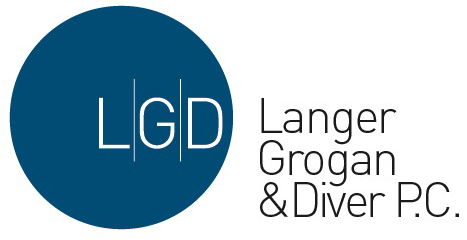Consumer Protection
Langer Grogan & Diver is committed to protecting consumers from dishonest corporations and deceptive practices, and, as experts in class action practice, in finding ways to halt marketplace abuses and provide wide relief. We have been at the forefront of the fight against predatory “payday” loans that target our most vulnerable citizens. We have challenged misleading credit reports and background checks that ruin consumers’ financial standing and prevent them from getting jobs they deserve. And we have defended homeowners from abusive practices in the real estate and mortgage markets.
Using the federal racketeering (“RICO”) statute and other legal strategies, we have successfully targeted third party participants in consumer fraud schemes. We are particularly interested in holding accountable the financial institutions and service organizations that may be facilitating or fueling abusive practices in the marketplace and in penetrating the legal structures these players have designed to immunize themselves. If you have been harmed by an unfair or deceptive practice, please contact us here.
Predatory Payday Lending
“Payday” loans, auto title loans and other short-term, abusive credit products are illegal in Pennsylvania. Nonetheless, unscrupulous businesses have managed to find ways to circumvent Pennsylvania law and entrap consumers in these dangerous debt traps, particularly through the use of the Internet. We have successfully shut down illegal lending and collection operations and obtained restitution for victimized consumers.
Langer Grogan & Diver successfully represented the Pennsylvania Attorney General in litigation against a Texas-based finance company that was partnering with Native American tribes to do this form of lending over the Internet, and against the private equity firm and collection company that was assisting the scheme. Commonwealth of Pennsylvania v. Think Finance, Inc., 14-7139 (E.D. Pa. 2021). This litigation was a catalyst for a national settlement in bankruptcy court that closed the company and is producing a multi-million-dollar distribution to victimized consumers.
Previously, the firm successfully handled a class action against a company that used a bank to help it conduct storefront payday lending in Philadelphia. The lending ceased and there was a distribution to thousands of consumers. In re Frascella Enterprises, 349 B.R. 421 (Bankr. E.D. Pa. 2006).
Facilitating Consumer Fraud
The Racketeer Influenced and Corrupt Organizations (“RICO”) Act targets more than mob bosses and organized crime. It also applies to corporations that knowingly help others deceive and steal from consumers. Langer Grogan & Diver has had great success recovering the proceeds of such illegal activity. The firm also routinely advises other attorneys prosecuting civil RICO matters. Attorney Peter Leckman teaches civil RICO at the University of Pennsylvania Law School.
The firm’s work in this area resulted in two New York Times exposes:
Charles Duhigg, “Bilking the Elderly, With a Corporate Assist,” New York Times, May 20, 2007, http://www.nytimes.com/2007/05/20/business/20tele.html.
Jessica Silver-Greenberg, “Banks Seen as Aid in Fraud Against Older Consumers,” New York Times, June 10, 2013, http://www.nytimes.com/2013/06/11/business/fraud-against-seniors-often-is-routed-through-banks.html.
In a 2018 civil RICO suit, the firm won multi-million dollar judgments against a Canadian-based fraudster and the Florida law firm that assisted him in his serial, advance-fee scheme. Stevens v. Westmoreland Equity Fund (E.D. Pa.)
In 2016, the firm settled a civil RICO case brought on behalf of depositors against Zions First National Bank, for its involvement in a scheme to defraud hundreds of thousands of depositors throughout the United States using unauthorized withdrawals from their accounts. The settlement was for $37.5 million and followed a detailed opinion in favor of the plaintiffs from the Court of Appeals for the Third Circuit. Reyes v. Netdeposit, LLC, 802 F.3d 469 (3d Cir. 2015).
In 2010, the firm recovered over $150 million dollars from Wachovia Bank on behalf of primarily elderly victims of telemarketing fraud. Checks were mailed to approximately eight hundred thousand victims in the full amounts taken from their accounts. Faloney v. Wachovia Bank (E.D. Pa.).
Employment Background Screening
Large employers’ use of “big data” background screening has significantly injured many low-wage workers. The principal legal tool for remedying these injuries is the federal consumer statute, the Fair Credit Reporting Act (“FCRA”). Langer Grogan & Diver has used the FCRA successfully in class actions directed against the background reporting industry.
Langer Grogan & Diver served as lead counsel in a class action that exposed and ultimately terminated a secret “theft database” used by the retail industry against employees with clean criminal records who were unknowingly labeled as unemployable “thieves” by previous employers. See Goode v. LexisNexis Risk & Information Analytics Group, Inc., 848 F. Supp. 2d 532 (E.D. Pa. 2012); Stephanie Clifford and Jessica Silver-Greenberg, “Retailers Track Employee Theft in Vast Databases,” N.Y. Times (April 3, 2013), https://www.nytimes.com/2013/04/03/business/retailers-use-databases-to-track-worker-thefts.html.
The class settlement, approved in February 2015, resulted in the suspension of the database, individual statutory damage checks near the maximum amount the FCRA permits, and several dozen actual damage recoveries.
Residential Mortgages
Langer Grogan & Diver works to protect Pennsylvania homeowners from abusive practices in the real estate and mortgage market. This work has focused on mortgage origination practices, the mortgage servicing industry and the Pennsylvania foreclosure process. Irv Ackelsberg is the author of the legal treatise, Residential Mortgage Foreclosure: Pennsylvania Law and Practice (George T. Bisel Co. 2014, 2d edition), and is widely recognized as the leading Pennsylvania expert on foreclosure defenses.
Gillespie v. Loancare (Phila. Common Pleas) – In 2020, the firm settled for full recovery for a class of mortgage holders who were charged improperly assessed late fees on their mortgage payments.
Wilson v. Bank of Am., N.A., 48 F. Supp. 3d 787 (E.D. Pa. 2014) – This case was among the first cases that enforced enhanced mortgagor rights established by “notice of error” and “request for information” regimes promulgated by the Consumer Financial Protection Bureau under the Dodd Frank Act.
Representing Consumer Creditors in Chapter 11 Bankruptcies
Consumer class actions against a company engaged in questionable business practices can often trigger a bankruptcy filing by the defendant business. The firm has developed a unique expertise in representing consumer classes in those bankruptcies. This work magnifies the class’s leverage over estate resources and has preserved post-bankruptcy legal remedies. Irv Ackelsberg has served on several Official Creditor Committees and is a leader in the field
After triggering a payday lending company’s Chapter 11 filing, the firm worked with local bankruptcy counsel to uphold the Commonwealth of Pennsylvania’s right to continue its police/regulatory action against the company and worked with national class counsel to negotiate a nationwide consumer settlement in the bankruptcy court. In re Think Finance (Bankr. N.D. Tex.).
In establishing the right of consumer creditors to use Federal Rule 23 to prosecute class proofs of claim, Gentry v. Siegel, 668 F.3d 83 (4th Cir. 2012), adopted the position espoused in an amicus curiae brief the firm filed on behalf of National Association of Consumer Advocates and National Association of Consumer Bankruptcy Attorneys.
SCH Corp. v. CFI Class Action Claimants, 569 Fed. Appx. 119 (3d Cir. 2014) reversed the district court’s use of the equitable mootness doctrine to dismiss a consumer class’s appeal of bankruptcy court’s denial of the class’s motion for sanctions against the debtor’s parent company.
Student Loan Borrower Protection
Turrey v. Vervent, Inc., 20-CV-0697 DMS (S.D. Cal.) was brought on behalf of student borrowers who paid more than $80 million dollars on private student loans related to attendance at ITT. The case was brought by former ITT students over a predatory lending scheme on behalf of ITT Education Services Inc. to which Vervent, Inc. was the servicer of the PEAKS student loan program. The PEAKS loan portfolio was valued at over $300 million dollars.
Langer Grogan & Diver PC represented the student borrowers along with co-counsel Tim Blood, James Davis and Paula Brown of Blood, Hurst and O’Reardon and Paul Arons of The Law Office of Paul Arons.
This is the first civil RICO jury verdict LGD is aware of where a servicer has been found liable as a conspirator with the primary wrong









